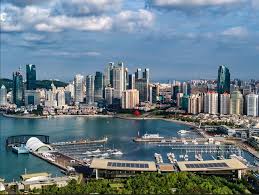The Macau Post Daily interviewed a number of people on Wednesday in the peninsula’s “Three Lamps” area (Rotunda de Carlos da Maia) about their views on the government’s consolidation period in its ongoing fight against COVID-19.
‘The consolidation period is good, but people need to control themselves’
A 24-year-old basketball coach surnamed Tong said he thinks that it would be good for the government to extend the consolidation period for one more week to stabilise the situation of the current COVID-19 outbreak, adding that it would be troublesome to discover a new case while the community is still recovering from the outbreak.
Tong said the consolidation period is “good”, but he was quick to add that it also depends on people’s awareness, pointing out that there were more people going outside in the past two days than in the previous days. He also said he hopes that people only go outside to buy daily necessities.
Tong pointed out that he has seldom gone out during the consolidation period, adding that he had only been out three times this week to collect his parcels and buy food. In order to protect himself from COVID-19, Tong said that he sprays himself with rubbing alcohol before he has a shower every time he gets home.
When asked about the new rounds of the citywide’s nucleic acid tests (NATs), Tong described the NATs as useful, but said he thinks that it’s not “really useful” to launch the NATs one whole week after the previous round last Saturday and Sunday, adding that people should undergo them once every three to four days. However, he said he agrees with the government to have a NAT rather than a rapid antigen test (RAT), which he thinks is prone to be inaccurate.
Moreover, Tong said he expects society to recover soon with no newly confirmed cases for COVID-19 so that he can go back to work as quickly as possible, pointing out that the summer extracurricular classes (aka interest classes) run by the Education and Youth Development Bureau (DSEDJ), as well as those by his school have been cancelled or suspended due to the current COVID-19 outbreak.
‘Consolidation period has lost its function’
Wong, who works as a nurse, described the consolidation period as “useless”, saying that people have already been walking around since the first day of the weeklong period, so she thinks the government should urge people again to stay at home even though it may be difficult to implement such a measure.
Wong underlined that she needs to work every day, so she must put on her KN95 facemask when going out and wash her hands after work. However, she said she expects the government to announce that people do not need to wear KN95 facemasks anymore, or even any facemasks at all, once the current COVID-19 outbreak has stabilised.
Moreover, Wong said she hopes that after the consolidation period, she can have again meals at restaurants with her friends, adding that she has already lost contact with some of her friends since the current COVID-19 outbreak started on June 18.
‘Consolidation period equals buffer period’
Chan, 26, who works for a social welfare organisation, said that the consolidation period is a “buffer period” for the government to implement other measures in response to the current COVID-19 outbreak, adding that the period has its specific functions, even though it may not be a “dynamic zero COVID” strategy.
“Instead of extending the consolidation period, I hope the government cancels all COVID-19 prevention measures, including the consolidation period, so that people’s lives can get back to normal and be able to work again, while venues can reopen to the public”, Chan said.
When asked about his precautions for COVID-19 while working, Chan said that besides undergoing NATs and wearing a facemask every day as required by his company, he does not take any “special” precautions to prevent COVID-19, adding that he has already returned to “normal life”. However, he said, he hopes that the government can switch from the KN95 facemasks to another type of facemask, complaining that the KN95 facemasks are “too small” for him. He said they are “hell” to wear for eight hours at work.
Chan described the new NAT rounds as “role- playing”, but added that it could be a “final examination” for the government to collect the data of newly confirmed COVID-19 cases, even though he thinks it is “meaningless” to carry them out. However, Chan said, “I do not mind having the test every day if the government opens the local economy and people are allowed to work as normal.”
In addition, Chan said he believed that society will finally have to “live with the virus”, adding that due to the government’s previous COVID-19 prevention and control measures people at that time were unable to visit hospitals even if their suffered from stomach aches. Therefore, he said, if he could choose, he would prefer to be allowed to seek hospital treatment anytime, rather than prevent COVID-19 with “just light symptoms”.
‘A good decision’
Although remarking that the consolidation period is a “good decision”, Shrestsj, a Nepalese security guard, said he hopes that it can end as soon as possible as everyday life has become difficult.
The 31-year-old said that even if major shops are open again, there are still difficulties in terms of getting daily necessities. Moreover, he said, Macau is not close to getting back to normal yet, but he added that he’s optimistic given that there have been zero positive cases in the community during the mandatory NATs this week. “Looking at that, maybe in one or two weeks, the situation will be back to normal”, he pointed out.
Shrestsj, who said he makes sure that he always follows government protocols and minimises going out aside from work, buying necessities and undergoing his daily NATs, commented that he hopes that the mandatory wearing of KN95 facemasks will be abolished soon as they can be “suffocating” and may present difficulties for the elderly.
‘A week of observation is enough’
Meanwhile, Jimena, a 40-year-old Filipina non-resident worker (NRW), said that “a week of observation [through the consolidation period] is enough” considering the number of people who have been affected by the economic impact of the recent outbreak and the challenges that they have been facing, such as unpaid leave.
She also underlined the importance of following the government’s policies, adding that there are no issues with the measures. She also said that everyone, including Filipinos, have been assisted by the government throughout the pandemic, which has affected Macau since January 2020.
Besonia, 31, who was interviewed together with Jimena, added that the situation would improve if people heed the government’s COVID-19 prevent and control measures.
Both interviewees also said they hope that the city will return to normal by next week and that the upcoming NATs will not yield any more positive results.
‘For our safety’
Pahas, a Filipina domestic helper aged 40, said that she agreed with the implementation of the consolidation period and supports the government’s current and future measures as they are for the benefit of the people. “We are used to the situation [COVID-19] and whatever law they [the government] puts into place, we just have to follow it for our own safety.”
People shop for goods in the “Three Lamps” neighbourhood on Wednesday, on the sidelines of The Macau Post Daily’s vox pop interviews on that day.
Photo: Rui Pastorin






